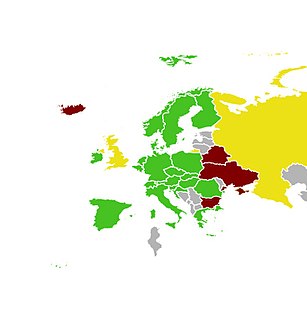Related Research Articles
Privacy is the ability of an individual or group to seclude themselves or information about themselves, and thereby express themselves selectively.

Digital media means any communication media that operate with the use of any of various encoded machine-readable data formats. Digital media can be created, viewed, distributed, modified, listened to, and preserved on a digital electronics device. Digital can be defined as any data represented by a series of digits, while media refers to methods of broadcasting or communicating these information. Together, digital media refers to mediums of digitized information broadcast to us through a screen and/or a speaker. This also includes text, audio, video, and graphics that are transmitted over the internet for viewing or listening to on the internet.

Identity theft occurs when someone uses another person's personal identifying information, like their name, identifying number, or credit card number, without their permission, to commit fraud or other crimes. The term identity theft was coined in 1964. Since that time, the definition of identity theft has been statutorily defined throughout both the U.K. and the United States as the theft of personally identifiable information. Identity theft deliberately uses someone else's identity as a method to gain financial advantages or obtain credit and other benefits, and perhaps to cause other person's disadvantages or loss. The person whose identity has been stolen may suffer adverse consequences, especially if they are falsely held responsible for the perpetrator's actions. Personally identifiable information generally includes a person's name, date of birth, social security number, driver's license number, bank account or credit card numbers, PINs, electronic signatures, fingerprints, passwords, or any other information that can be used to access a person's financial resources.
The right to privacy is an element of various legal traditions that intends to restrain governmental and private actions that threaten the privacy of individuals. Over 150 national constitutions mention the right to privacy.

Cybercrime is a crime that involves a computer and a network. The computer may have been used in the commission of a crime, or it may be the target. Cybercrime may harm someone's security and financial health.
The Berkman Klein Center for Internet & Society is a research center at Harvard University that focuses on the study of cyberspace. Founded at Harvard Law School, the center traditionally focused on internet-related legal issues. On May 15, 2008, the center was elevated to an interfaculty initiative of Harvard University as a whole. It is named after the Berkman family. On July 5, 2016, the Center added "Klein" to its name following a gift of $15 million from Michael R. Klein.

Pornography in Europe has been dominated by a few pan-European producers and distributors, the most notable of which is the Private Media Group that successfully claimed the position previously held by Color Climax Corporation in the early 1990s. Most European countries also have local pornography producers, from Portugal to Serbia, who face varying levels of competition with international producers. The legal status of pornography varies widely in Europe; its production and distribution are illegal in countries such as Ukraine, Belarus and Bulgaria, while Hungary is noted for having liberal pornography laws.
Internet vigilantism is the act of carrying out vigilante activities through the Internet. The term encompasses vigilantism against alleged scams, crimes, and non-Internet related behavior.
Internet safety or online safety or cyber safety and E-Safety is trying to be safe on the internet and is the act of maximizing a user's awareness of personal safety and security risks to private information and property associated with using the internet, and the self-protection from computer crime.

Cyber ethics is the philosophic study of ethics pertaining to computers, encompassing user behavior and what computers are programmed to do, and how this affects individuals and society. For years, various governments have enacted regulations while organizations have defined policies about cyberethics.

Digital footprint or digital shadow refers to one's unique set of traceable digital activities, actions, contributions and communications manifested on the Internet or digital devices. Digital footprints can be classified as either passive or active. The former is composed of a user's web-browsing activity and information stored as cookies. The latter is often released deliberately by a user to share information on websites or social media. While the term usually applies to a person, a digital footprint can also refer to a business, organization or corporation.

Copyright infringement is the use of works protected by copyright without permission for a usage where such permission is required, thereby infringing certain exclusive rights granted to the copyright holder, such as the right to reproduce, distribute, display or perform the protected work, or to make derivative works. The copyright holder is typically the work's creator, or a publisher or other business to whom copyright has been assigned. Copyright holders routinely invoke legal and technological measures to prevent and penalize copyright infringement.
Child abduction or child theft is the unauthorized removal of a minor from the custody of the child's natural parents or legally appointed guardians.
The term international child abduction is generally synonymous with international parental kidnapping,child snatching, and child stealing. However, the more precise legal usage of international child abduction originates in private international law and refers to the illegal removal of children from their home by an acquaintance or family member to a foreign country. In this context, "illegal" is normally taken to mean "in breach of custodial rights" and "home" is defined as the child's habitual residence. As implied by the "breach of custodial rights," the phenomenon of international child abduction generally involves an illegal removal that creates a jurisdictional conflict of laws whereby multiple authorities and jurisdictions could conceivably arrive at seemingly reasonable and conflicting custodial decisions with geographically limited application. Such a result often strongly affects a child's access and connection to half their family and may cause the loss of their former language, culture, name and nationality, it violates numerous children's rights, and can cause severe psychological and emotional trauma to the child and family left behind.
Kik Messenger, commonly called Kik, is a freeware instant messaging mobile app from the Canadian company Kik Interactive, available free of charge on iOS and Android operating systems. It uses a smartphone's data plan or Wi-Fi to transmit and receive messages, photos, videos, sketches, mobile web pages, and other content after users register a username. Kik is known for its features preserving users' anonymity, such as allowing users to register without the need to provide a telephone number or valid email address. However, the application does not employ end-to-end encryption, and the company also logs user IP addresses, which could be used to determine the user's ISP and approximate location. This information, as well as "reported" conversations, are regularly surrendered upon request by law enforcement organizations, sometimes without the need for a court order.
There is medium internet censorship in France, including limited filtering of child pornography, laws against websites that promote terrorism or racial hatred, and attempts to protect copyright. The "Freedom on the Net" report by Freedom House has consistently listed France as a country with Internet freedom. Its global ranking was 6 in 2013 and 12 in 2017. A sharp decline in its score, second only to Libya was noted in 2015 and attributed to "problematic policies adopted in the aftermath of the Charlie Hebdo terrorist attack, such as restrictions on content that could be seen as ‘apology for terrorism,’ prosecutions of users, and significantly increased surveillance."

Chris Jay Hoofnagle is an American professor at the University of California, Berkeley who teaches information privacy law, computer crime law, regulation of online privacy, internet law, and seminars on new technology. Hoofnagle has contributed to the privacy literature by writing privacy law legal reviews and conducting research on the privacy preferences of Americans. Notably, his research demonstrates that most Americans prefer not to be targeted online for advertising and despite claims to the contrary, young people care about privacy and take actions to protect it. Hoofnagle has written scholarly articles regarding identity theft, consumer privacy, U.S. and European privacy laws, and privacy policy suggestions.

PhotoDNA is an image-identification technology used for detecting child pornography and other illegal content reported to the National Center for Missing & Exploited Children (NCMEC) as required by law. It was developed by Microsoft Research and Hany Farid, professor at Dartmouth College, beginning in 2009. From a database of known illegal images and video files, it creates unique hashes to represent each image, which can then be used to identify other instances of those images.
Sharenting is the practice of parents publicizing content about their children on internet platforms. While the term was coined as recently as 2010, sharenting has become an international phenomenon with widespread presence in the United States, Spain, France, and the United Kingdom. As such, sharenting has also ignited disagreement as a controversial application of social media. Detractors find that it violates child privacy and hurts a parent-child relationship. Proponents frame the practice as a natural expression of parental pride in their children and argue that critics take sharenting posts out of context.

Catfishing is a deceptive activity where a person creates a fictional persona or fake identity on a social networking service, usually targeting a specific victim. The practice may be used for financial gain, to compromise a victim in some way, as a way to intentionally upset a victim, or for wish fulfillment. Catfishing television shows have been produced, often featuring victims who wish to identify their catfisher. Celebrities have been targeted, which has brought press attention to catfishing practices.
References
- ↑ "The Growing Threat to Your Kids Online". ParentMap. Retrieved 2020-03-06.
- ↑ Gallagher, Sean (2014-11-20). "12-year-old's online life brings an abductor to her doorstep". Ars Technica. Retrieved 2020-03-06.
{{cite web}}: CS1 maint: url-status (link) - ↑ Samantha Murphy Kelly (15 May 2019). "Virtual kidnappings are rattling families across the US". CNN. Retrieved 2020-03-06.
- ↑ "Using the Name or Likeness of Another | Digital Media Law Project". www.dmlp.org. Retrieved 2020-03-06.
- ↑ "Publication of Private Facts | Digital Media Law Project". www.dmlp.org. Retrieved 2020-03-06.